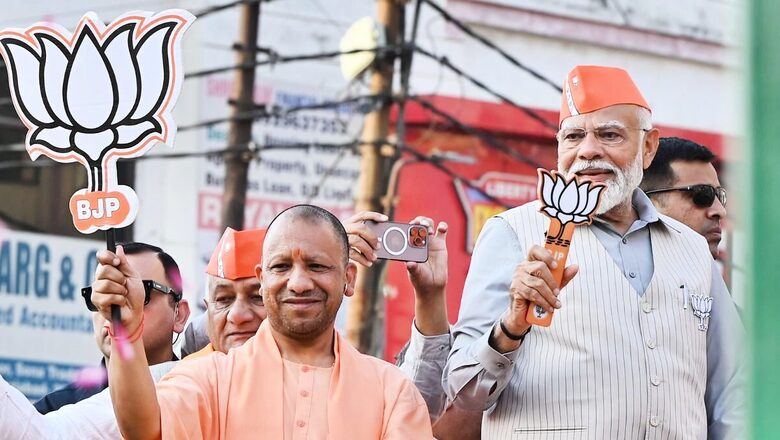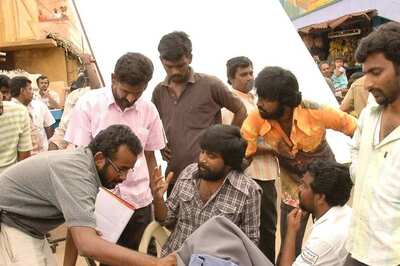
views
There has been a buzz in the national capital in the past few days since BJP’s Uttar Pradesh chief Bhupendra Chaudhary and Deputy Chief Minister Keshav Prasad Maurya were seen meeting leaders from the Centre. While both Maurya and Chaudhary have met BJP national president JP Nadda, Chaudhary has also got an audience with both Prime Minister Narendra Modi and Home Minister Amit Shah.
Sources said the state unit has prepared a 15-page document that highlights the reasons behind the party’s poor show in the recently concluded Lok Sabha elections.
“There has been a total decline of 8 per cent votes in the state for the BJP across all six divisions,” the state leadership told the top brass, sources said. BJP divides UP into mainly six regions — Western UP, Braj, Kanpur-Bundelkhand, Awadh, Gorakhpur and Kashi.
“The report also says Kurmi and Maurya castes moved away from the BJP this time, and the party only managed to get one-third of the Dalit votes,” the source told News18.
The 10 per cent decline in BSP’s vote share proved to be beneficial for Congress and its alliance partners in the state.
The report, which has been exclusively accessed by News18, speaks about the causes of concern and the possible solution that can help the cause of the saffron party in the country’s largest state.
“One of the most important factors listed by the state unit for the downfall was that the administration seems to be dominating the party and government. The overreach of the bureaucracy and the police on many issues has not gone down well with the public and, most importantly, BJP supporters. This was also pointed out by a couple of alliance partners,” the source said.
Also, the report said the attitude of the state’s top brass left party’s hardcore workers demoralised and disgruntled but there was no mechanism to listen to their complaints or concerns.
The tickets were announced very early, leading to the peaking of the party campaign a lot earlier compared to contemporaries. “The early announcement of the candidates created fatigue among party workers. This was a state with seven phases of election and by the time it reached the last few phases, there was a burnout in the cadre,” the source said.
What also hurt the BJP’s prospects in the state were the ill-timed statements on key issues like changes in the Constitution if the party crosses the 400-mark — a narrative milked by the Opposition that the BJP was unable to challenge.
Apart from this, the state was extremely upset with paper leaks and the inability to provide contractual jobs. “Over the last few years, it was evident to people that the government was not able to control paper leaks or hold competitive exams. Therefore, the inability to create contractual jobs was a matter of concern among the youth,” the source added.
Among the other issues that cost the party was that close to 30,000-40,000 hard-core BJP supporters found their names missing from the voter list on many seats.
“Confrontation to be kept aside and consensus on vital matters [is key]. Eventually, we just have a short span of time before the next assembly elections in 2027 so it is the need of the hour to take collective responsibility. The entire unit should pull up its socks,” a source told News18 about the discussion with the top brass.
News18 has learnt that the state unit prepared the report by speaking to more than 50,000 people across Uttar Pradesh. Those who gave their feedback were met on a one-to-one basis by top as well as bottom-rung leaders.
In the coming days, just like Maurya and Chaudhary, other state leaders will also be asked to come to Delhi to share their feedback. This includes Brijesh Pathak and Yogi Adityanath among others.
In the recent Lok Sabha elections, the Samajwadi Party won 37 of the 80 seats in Uttar Pradesh, up from five in 2019. BJP, meanwhile, was reduced to 33 seats from 62 seats in the 2019 polls.
The region-wise performance of the saffron party shows that it took the worst hit in Western UP and the Kashi belt. Of 28 seats, it could only win eight here.
In the Gorakhpur belt, where chief minister Yogi Adityanath comes from, only six of 13 seats came the saffron way. BJP was able to win just seven out of 16 seats in the Awadh region. Similarly, in Bundelkhand, it got just four out of 10 seats.
Keeping in mind the problems at hand and coming up with a solution that pleases all will be the first acid test for the party that has dominated UP for the last two terms in the state and whose government got its third term at the Centre. All eyes will be on how the BJP performs in the upcoming assembly bypolls. For the 10 seats that go to polls in UP, the state unit led by Adityanath has deployed the services of two-three ministers each.



















Comments
0 comment